To view the video pls click "VIEW VIDEO" (2.7mb)
by Patricia KHODER, Cheikh Walid el Khazen, avocat et chevalier de l
To view the video pls click "VIEW VIDEO" (2.7mb)
by Patricia KHODER, Cheikh Walid el Khazen, avocat et chevalier de l
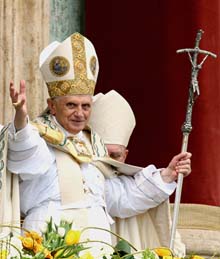 Thousands of people cheered loudly after Pope Benedict XVI blessed the crowd at St. Peter’s Square on Sunday and delivered a message of peace as he celebrated his first Easter mass as Pope. Speaking from the steps of St. Peter’s Basilica at Vatican City, Pope Benedict called on faithful Roman Catholics to pray for peace in Iraq and a solution to the conflict between Israelis and Palestinians.
Thousands of people cheered loudly after Pope Benedict XVI blessed the crowd at St. Peter’s Square on Sunday and delivered a message of peace as he celebrated his first Easter mass as Pope. Speaking from the steps of St. Peter’s Basilica at Vatican City, Pope Benedict called on faithful Roman Catholics to pray for peace in Iraq and a solution to the conflict between Israelis and Palestinians.
He called for dialogue to overcome the obstacles between Israelis and the Palestinians. He defended Israel’s right to exist, but called firmly for the establishment of a Palestinian state. Pope Benedict also spoke of the importance of finding a negotiated and "honourable solution" for the Iran nuclear crisis.
The Pope urged that peace would "finally prevail" in Iraq, where he said violence "continues mercilessly to claim victims." He also spoke of the hardships in Latin America and Africa, particularly Sudan’s troubled Darfur region. At the end of the mass, he addressed the crowd from the terrace of St. Peter’s Basilica to give the traditional Urbi et Orbi address (Latin for "to the city and to the world").
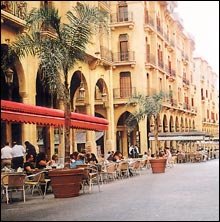 BEIRUT. (RIA Novosti political commentator Marianna Belenkaya) — These days the Lebanese are observing one more anniversary of the start of the civil war, which broke out in 1975 and ended in 1990.
BEIRUT. (RIA Novosti political commentator Marianna Belenkaya) — These days the Lebanese are observing one more anniversary of the start of the civil war, which broke out in 1975 and ended in 1990.
The 15 year long confrontation involved not only different ethnic, religious, and political groups in Lebanon but also outside forces. The war ended more than 15 years ago, but the Lebanese are haunted by the fear that history may repeat itself, and this fear is well justified. At the same time, Lebanon is trying to return its prewar glory of a Mid-Eastern Switzerland, a paradise for tourists and businessmen. Will discord prevail over a common striving of the Lebanese to make their country prosperous?
The lessons of the past are making the Lebanese politicians very cautious – despite periodic political rows inside the government and parliament, they always come back to the negotiating table. But does everything depend on the Lebanese alone? They are under a very strong influence of the outside forces, and their country depends too much on the geopolitical situation in the Middle East in general.
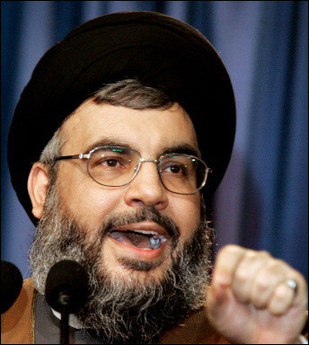 By Joseph Panossian, BEIRUT — Military intelligence has arrested a group of terrorists who planned to assassinate the leader of the Hezbollah militant group, Sheik Hassan Nasrallah, a senior Lebanese military official said yesterday. The plot was ”in the phase of intentions" and had not reached ”the phase of implementation," said the Lebanese official, who spoke on condition of anonymity because he was not authorized to speak to the media.
By Joseph Panossian, BEIRUT — Military intelligence has arrested a group of terrorists who planned to assassinate the leader of the Hezbollah militant group, Sheik Hassan Nasrallah, a senior Lebanese military official said yesterday. The plot was ”in the phase of intentions" and had not reached ”the phase of implementation," said the Lebanese official, who spoke on condition of anonymity because he was not authorized to speak to the media.
He told The Associated Press that nine Lebanese and Palestinian suspects were detained and would be handed over to a military prosecutor today for more questioning and indictment. The daily newspaper As-Safir reported yesterday that military intelligence had arrested the plotters last week after they were seen acting suspiciously near Hezbollah’s headquarters in the southern Beirut district of Haret Horeik. Authorities were looking for more members of the plot, the paper said.The military official told the AP that some of As-Safir’s details were true, ”but others are not so accurate." He would not elaborate.Nasrallah’s political adviser, Hussein Khalil, confirmed the assassination plot and arrests.
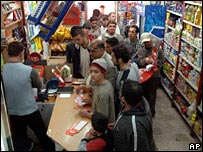 Lebanon came to a standstill on Monday night as the biggest lottery in the nation’s history was finally decided. No-one had won the top prize since the beginning of the year and lottery fever had gripped the country, with people buying tickets to the last minute.
Lebanon came to a standstill on Monday night as the biggest lottery in the nation’s history was finally decided. No-one had won the top prize since the beginning of the year and lottery fever had gripped the country, with people buying tickets to the last minute.
The jackpot ballooned to 6,306,619,438 Lebanese pounds, the equivalent of just over $4m. The surprise on the live television announcement was that there was not one winner but three. Dizzying amount Even construction sites in Beirut had fallen silent as workers paused clutching their lottery tickets and hoping. Thousands were dreaming about the dizzying amount of money that could change their lives in these dire economic times.
For weeks people forgot about the political upheaval in Lebanon, the bickering between politicians and the tense security situation, all pinning their hopes on the small, coloured, numbered balls. And then, the big surprise. For weeks no-one had hit the jackpot, but this time three people selected all six winning numbers. Even the presenter could not believe it as she repeated the results again and again.
 2006 Al Bawaba , Lebanese contestant Joseph Attieh won the title of Star Academy 3 by winning 55.15% of the votes defeating his opponent Egyptian contestant Hani Hussein who received 29.2% of the votes and Moroccan Hana Al Idreesi who received 15.65%.The final episode of the popular program featured Lebanese singer Wael Kfoury and Australian singer Tina Araira.Joseph is the first Lebanese to ever win the title of Star Academy with the first round going to Egyptian Mohammad Attieh and the second round to Saudi Hisham Abdul Rahman.
2006 Al Bawaba , Lebanese contestant Joseph Attieh won the title of Star Academy 3 by winning 55.15% of the votes defeating his opponent Egyptian contestant Hani Hussein who received 29.2% of the votes and Moroccan Hana Al Idreesi who received 15.65%.The final episode of the popular program featured Lebanese singer Wael Kfoury and Australian singer Tina Araira.Joseph is the first Lebanese to ever win the title of Star Academy with the first round going to Egyptian Mohammad Attieh and the second round to Saudi Hisham Abdul Rahman.
Star Academy was aired on the Lebanese Broadcasting Company (LBC) for a period of four months, and each week one of the contestants out of 19 was eliminated. It is a reality TV show started in 2003 that features a group of young male and female candidates from all over the Arab world. It is the Arabic adaptation of the French television show Star Academy produced by Netherlands company Endemol.The show is a competition to find the best young singer in the Arab world. The concept is training the students in several disciplines: singing, acting, vocalizing, theatre expression, musical culture and gymnastics. Then, each week, the three weakest students are nominated. During the prime show, where they perform and sing along with famous singers, the nominated student that didn’t win, neither by the public vote, or by its fellows’, is out of the game.
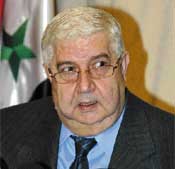 By Jihad Issa, The Foreign Affairs Minister said an exchange of ambassadors would be
By Jihad Issa, The Foreign Affairs Minister said an exchange of ambassadors would be
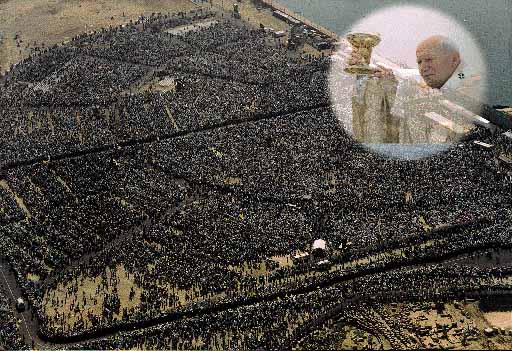 by Youssef Hourany, Pope John Paul II
by Youssef Hourany, Pope John Paul II
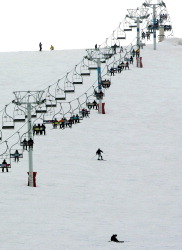 FARAYA, Lebanon — When Mart Maastik’s friends suggested a ski vacation in Lebanon, he was hesitant — and more than a little skeptical, especially about security."Skiing in the Middle East? I’d never heard of that," the 41-year-old Estonian said while standing in full skiing gear at the foothills of the Faraya-Mzaar mountains.
FARAYA, Lebanon — When Mart Maastik’s friends suggested a ski vacation in Lebanon, he was hesitant — and more than a little skeptical, especially about security."Skiing in the Middle East? I’d never heard of that," the 41-year-old Estonian said while standing in full skiing gear at the foothills of the Faraya-Mzaar mountains.
But Lebanon, with six ski resorts and a season that generally runs from December through April, is increasingly drawing not just Arab tourists, but Europeans, too, industry officials say. Maastik, who is in the real estate business back home, has skied in Austria, Andorra, France "and almost everywhere else," but he feels Lebanon’s slopes have a different flavor."This is quite exotic for us," he said, saying he was taken with Lebanon’s hospitality and its good weather. He said he was worried about security at first. "But I decided to forget about politics and come anyway."
Business at the area’s biggest hotel, the InterContinental Mountain Resort & Spa, plunged more than 30 percent in 2005 because of political instability in Lebanon, general manager Robert Zogbi said. The country has seen at least 16 bombings since October 2004, the largest of which killed former Prime Minister Rafik Hariri a year ago.
 By James Owen, Published: March 31 2006 15:03, However hard you squint into the sun as it sets red over the Corniche, Beirut nowadays does not much resemble the
By James Owen, Published: March 31 2006 15:03, However hard you squint into the sun as it sets red over the Corniche, Beirut nowadays does not much resemble the